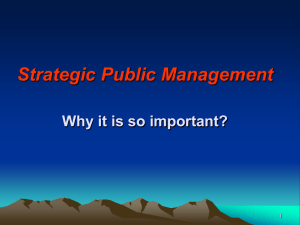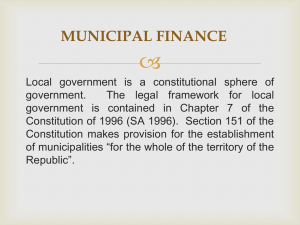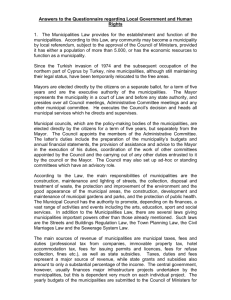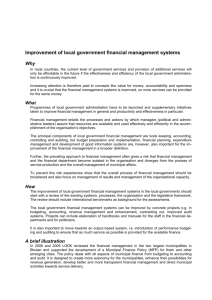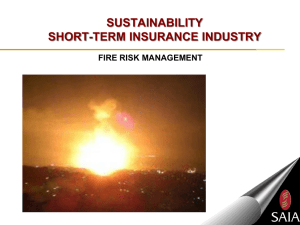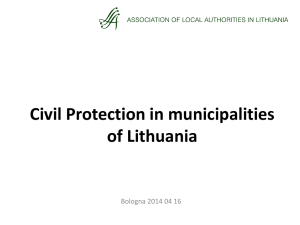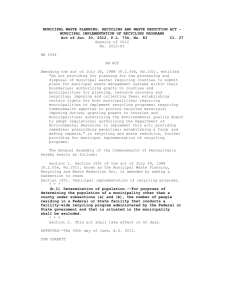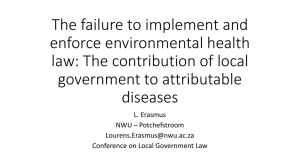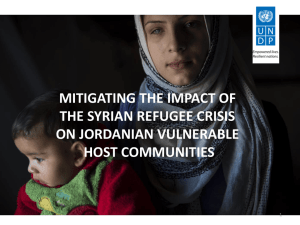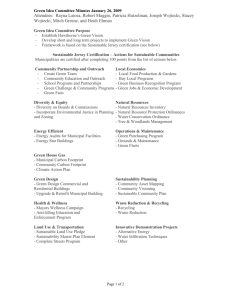Terms of Reference for Project.
advertisement
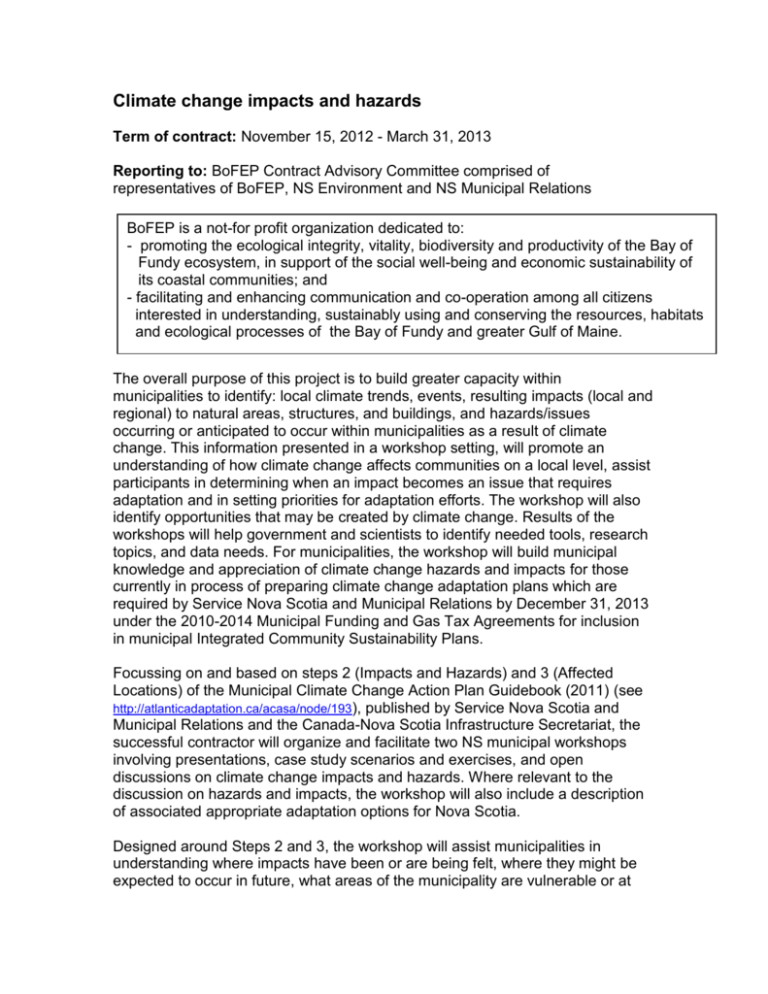
Climate change impacts and hazards Term of contract: November 15, 2012 - March 31, 2013 Reporting to: BoFEP Contract Advisory Committee comprised of representatives of BoFEP, NS Environment and NS Municipal Relations BoFEP is a not-for profit organization dedicated to: - promoting the ecological integrity, vitality, biodiversity and productivity of the Bay of Fundy ecosystem, in support of the social well-being and economic sustainability of its coastal communities; and - facilitating and enhancing communication and co-operation among all citizens interested in understanding, sustainably using and conserving the resources, habitats and ecological processes of the Bay of Fundy and greater Gulf of Maine. The overall purpose of this project is to build greater capacity within municipalities to identify: local climate trends, events, resulting impacts (local and regional) to natural areas, structures, and buildings, and hazards/issues occurring or anticipated to occur within municipalities as a result of climate change. This information presented in a workshop setting, will promote an understanding of how climate change affects communities on a local level, assist participants in determining when an impact becomes an issue that requires adaptation and in setting priorities for adaptation efforts. The workshop will also identify opportunities that may be created by climate change. Results of the workshops will help government and scientists to identify needed tools, research topics, and data needs. For municipalities, the workshop will build municipal knowledge and appreciation of climate change hazards and impacts for those currently in process of preparing climate change adaptation plans which are required by Service Nova Scotia and Municipal Relations by December 31, 2013 under the 2010-2014 Municipal Funding and Gas Tax Agreements for inclusion in municipal Integrated Community Sustainability Plans. Focussing on and based on steps 2 (Impacts and Hazards) and 3 (Affected Locations) of the Municipal Climate Change Action Plan Guidebook (2011) (see http://atlanticadaptation.ca/acasa/node/193), published by Service Nova Scotia and Municipal Relations and the Canada-Nova Scotia Infrastructure Secretariat, the successful contractor will organize and facilitate two NS municipal workshops involving presentations, case study scenarios and exercises, and open discussions on climate change impacts and hazards. Where relevant to the discussion on hazards and impacts, the workshop will also include a description of associated appropriate adaptation options for Nova Scotia. Designed around Steps 2 and 3, the workshop will assist municipalities in understanding where impacts have been or are being felt, where they might be expected to occur in future, what areas of the municipality are vulnerable or at risk, and in identifying any additional and available resource materials, information, skills, or expertise needed to map and assess the degree of impact to vulnerable sites. For each of Steps 2 and 3, the contractor will guide participants through the series of self-assessment questions specified in the guidebook (and others as appropriate) which are designed to delve deeply into climate change impacts, affects and accompanying municipal issues. More specifically, the workshop will: a) provide an overview of potential trends, hazards and projections associated with climate and weather related changes in NS and outline the benefits and importance of planned adaptation to climate change through development of a climate change action plan; b) develop a deeper understanding of: weather related and climate related changes that NS municipalities have experienced in the past (e.g. hazards or impacts that have become significant issues and the kinds of events that caused these issues; actions or measures taken to address or respond to the issues); climate changes that are expected/unanticipated in future (e.g. range of issues; frequency, extent, and severity of events) and how these climate changes may exacerbate or cause new hazards and issues in municipalities (e.g. importance of determining how well prepared the municipality is to address hazards and events if they occur again or become more frequent or severe and municipal capacity/resources to manage the next event); opportunities that may result from future climate changes and how to use them to best advantage; areas/locations where impacts have occurred or likely will occur and may become more problematic or cause significant issues that require adaptation; how to define the geographic extent of a hazard within the municipality; the importance and use of overlay maps to identify and define the extent of vulnerable areas where impacts and issues are likely to occur; how to complete a climate change hazard impact matrix; available resources and tools to map and determine which areas of a municipality are at higher risk; and which additional information, skills, expertise or resources may be required to complete steps 2 and 3 to address impacts and issues and where this information can be obtained (e.g. access to consultants, government and scientists; published research information specific to NS); the level of stakeholder involvement needed during steps 2 and 3; c) present workshop information through virtual case study scenarios and exercises involving the completion of a climate change hazard impact matrix and potentially a field trip(s) to illustrate various climate change impacts, hazards, and situations/scenarios, of interest/relevance to workshop participants. Such a hands-on activity would provide opportunities for participants to learn from the immediate application of workshop information and to discuss/ask questions about their own specific climate change issues/situations with attending government agencies and climate change consultants. The completion of the matrix would provide participants experience in how to assign a relative degree of impact to the changing events affecting the municipality ie to determine the level of climate change risk or risk score. It further enables participants to summarize information derived from answering the self assessment questions. Key responsibilities: The successful contractor will: a) Work closely with the BoFEP Advisory Committee members to ensure that workshop design and content, location, and engagement of municipalities meets the requirements of NS Municipal Relations and NS Environment, and complements and adds value to their climate change work, thereby avoiding duplication of effort; b) Review the Municipal Climate Change Action Plan Guidebook (2011), Municipal Learnings Project, three Mentor’s Reports for the Municipality of the County of Cumberland, Municipality of the District of Lunenburg, and the Town of Yarmouth, and Atlantic Climate Solutions Association (ACASA) projects for information and lessons learned/helpful advice or scientific data relevant to steps 2 and 3 to incorporate into this workshop (see http://atlanticadaptation.ca/acasa/node/193 ); c) Ensure that the workshop, design, content, the case study scenarios/interactive sessions, and planned discussions reflect, and are relevant to the needs of NS municipalities planning to attend the workshop. To meet these requirements, the contractor must conduct an initial needs survey by: i) speaking with NS Municipal Relations and NS Environment to identify these municipal needs; ii) reviewing the three Mentor’s reports, ACAS projects, and followup Municipal Learnings Project to identify municipal information needs/resource requirements, appropriate data/scientific information, and information/advice/tips relevant to steps 2 and 3; and iii) conducting an initial survey of those municipalities planning to attend, to identify municipal scenarios or issues of concern, needed reference /resource materials and information/data. d) Design, organize, host and facilitate two workshops for Municipal representatives in locations recommended by NS Municipal Relations and NS Environment; d) Develop a participant workshop evaluation form; e) Provide all needed reading, reference/resource materials to be used in workshop scenarios/interactive sessions; f) Provide a list of useful resource/reference materials for use by municipalities in Steps 2 and 3 and subsequent steps of the guideline process; g) Document workshop presentations, discussions and results; h) Prepare a final report presenting: i) an overview of the workshop outline/content, description of scenario exercises, presentation overviews; ii) a summary of results: the results of the initial needs/informational survey (described in b) above; the case study/scenario exercise, completed hazard impact matrix, summary of questions asked, issues/concerns, identified informational needs, and requests for research/data/information; results of participant evaluations of the workshop, etc.; iii) a full reference list; iii) your recommendations e.g. regarding policy issues/suggestions; MCCAP Guide process; challenges for municipalities; workshop lessons learned; ideas for future support in the development of municipal climate change action plans; future presentations/workshops; approaches to municipal capacity building; involvement of provincial and federal government in considering climate change impacts; future efforts to support municipalities; research topics and data requirements; needed tools/information/resources; opportunities for collaboration and or partnership, etc. Contract project deliverables: a) Two Nova Scotia Municipal workshops on climate change hazard and impacts identification and location in Nova Scotia; b) The draft report is to be sent electronically to the BoFEP Advisory Committee for review; c) The final report, approved by the BoFEP Advisory Committee, summarizing workshop content, presentations, discussions, case study scenario exercises and field trip; results/overview of the climate change hazard impact matrix, workshop evaluations, and recommendations, is to be distributed electronically to workshop participants; d) Preparation of a short (300 word) article for Fundy Tidings summarizing the workshop, its results and recommendations. A copy of the final report will be placed on the BoFEP website by BoFEP. How to apply: Are you excited about this opportunity? Do you think you are the ideal candidate for this position? In 3 pages or less: please briefly outline your qualifications/experience, the approach you would take, and confirm your ability to meet contract requirements and complete the work by March 31, 2013. Please also provide the names and contact information for 3 references. The application should be emailed to Leanna McDonald, BoFEP Secretariat, Acadia University, Wolfville (email: leanna.mcdonald@acadiau.ca) by October 31, 2012. Budget: Contractor 2 Workshops (space, catering; space rental) Workshop resource/reference materials Final summary report Travel (car rental 4 days; 2 people accommodation & meals) Short article Fundy Tidings Costs associated with research Total: 15,000 1,000 100 4,000 1,000 100 300 21,500 We thank all applicants for their interest. However, we may contact only those candidates selected for interviews.
